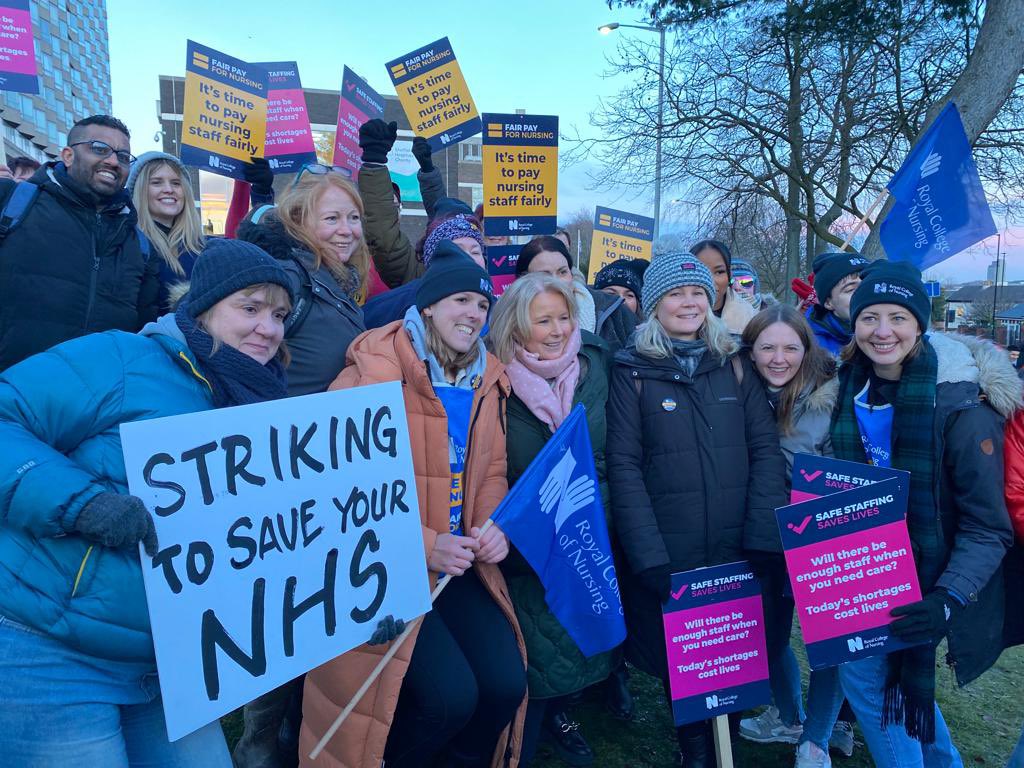The escalation in industrial action comes as thousands of nurses are on strike on Wednesday and Thursday this week at more than 55 NHS trusts in England…reports Asian Lite News
Thousands of ambulance workers and nurses will go on strike on the same day next month as the pay dispute with the Government shows no signs of reaching a resolution.
The GMB union said more than 10,000 ambulance workers, including paramedics, emergency care assistants and call handlers, will stage strikes on February 6, February 20, March 6 and March 20.
Nurses are also due to strike on February 6 – meaning mass disruption can be expected across the NHS on that day. Nurses will also strike the following day, February 7.
The escalation in industrial action comes as thousands of nurses are on strike on Wednesday and Thursday this week at more than 55 NHS trusts in England.
One nurse told the Health Secretary that “every day is a challenge” as he visited a hospital in north-west London during the nursing strike.
Alicia Borja told Steve Barclay at Northwick Park Hospital in Harrow: “We have so many ambulances coming here. We cover a very big area and we are always short of staff, that’s another challenge, but we try to pull together and we have a very good team.
Speaking to broadcasters during the visit, Barclay appeared to rule out a 10% pay rise for nurses, insisting it was “not affordable”.
“Well 10% is not affordable, it would be an extra £3.6 billion a year and obviously that would take money away from patient services, essential services that we need to invest in given the backlogs from the pandemic,” he said.
“Now, within Government we take a whole Government approach – of course I have discussions with the Treasury, as do other Secretaries of State, and these things need to be balanced not just with the needs of teachers, with the Education Secretary, or train drivers with the Transport Secretary, but also what’s affordable for your viewers in terms of their own cost-of-living pressures.”
He insisted he was working “constructively” with unions but said he was “disappointed” in the strikes.
It comes as a new YouGov poll of 2,000 UK adults found that the majority of people are not confident that they would get the treatment they needed if they called 999 with a health emergency.
Some 24% of those who responded to the Channel 4 News survey said they were “not confident at all” and a further 36% said they were “not very confident” while only 4% said they were very confident they would get the assistance they needed.
On the fresh wave of strikes announced, NHS Providers’ interim chief executive Saffron Cordery said: “Four more days of strikes by GMB ambulance staff will deal another blow to already overloaded health services. And now Unite is set to announce more ambulance strikes by its members.
“We understand the strength of feeling among NHS staff and nobody wants these strikes to happen.
“To stave off another wave of strikes and help the NHS, the Government must sit down with the unions urgently and address pay for the current financial year. Trusts plan and prepare for industrial action to support staff and do all they can to minimise the impact on patients and day-to-day business. But with incredibly high levels of A&E attendances and delays discharging patients from hospital beds severely hampering overstretched ambulance services, things are likely only to get worse if these strikes go ahead.”
Pat Cullen, chief executive and general secretary of the Royal College of Nursing (RCN), said earlier that nurses feel “totally heartbroken” at going on strike, but have no choice.
She urged the Government to get back around the table to “resolve this dispute” but said no talks are currently scheduled.
She told the PA news agency that the Government cannot afford to lose “one single nurse”.
She said: “No nurse should be ashamed to say that, actually, they’re really struggling to live on the meagre salaries that this Government’s paying them.
“It’s their right to be paid a decent wage.”
She told ITV’s Good Morning Britain that the NHS is not currently delivering an acceptable minimum staffing level, which “flies in the face” of new anti-strike laws calling for minimum service cover on strike days.
“Minimum staffing levels are not available for our patients or our nurses on any day of the week,” she said.
“So to try and suggest that we’re going to have minimum staffing levels on days of industrial action is just so far removed from reality, and in fact it is a total insult to our patients and to nurses – it just doesn’t happen.
Asked if “inflationary pay deals” will end up taking money out of the NHS, as Mr Barclay has claimed, she said: “We can either have our focus totally on balancing the books or we can continue to respect and treat this NHS as it should be for every single patient right throughout the country.

Leave a Reply